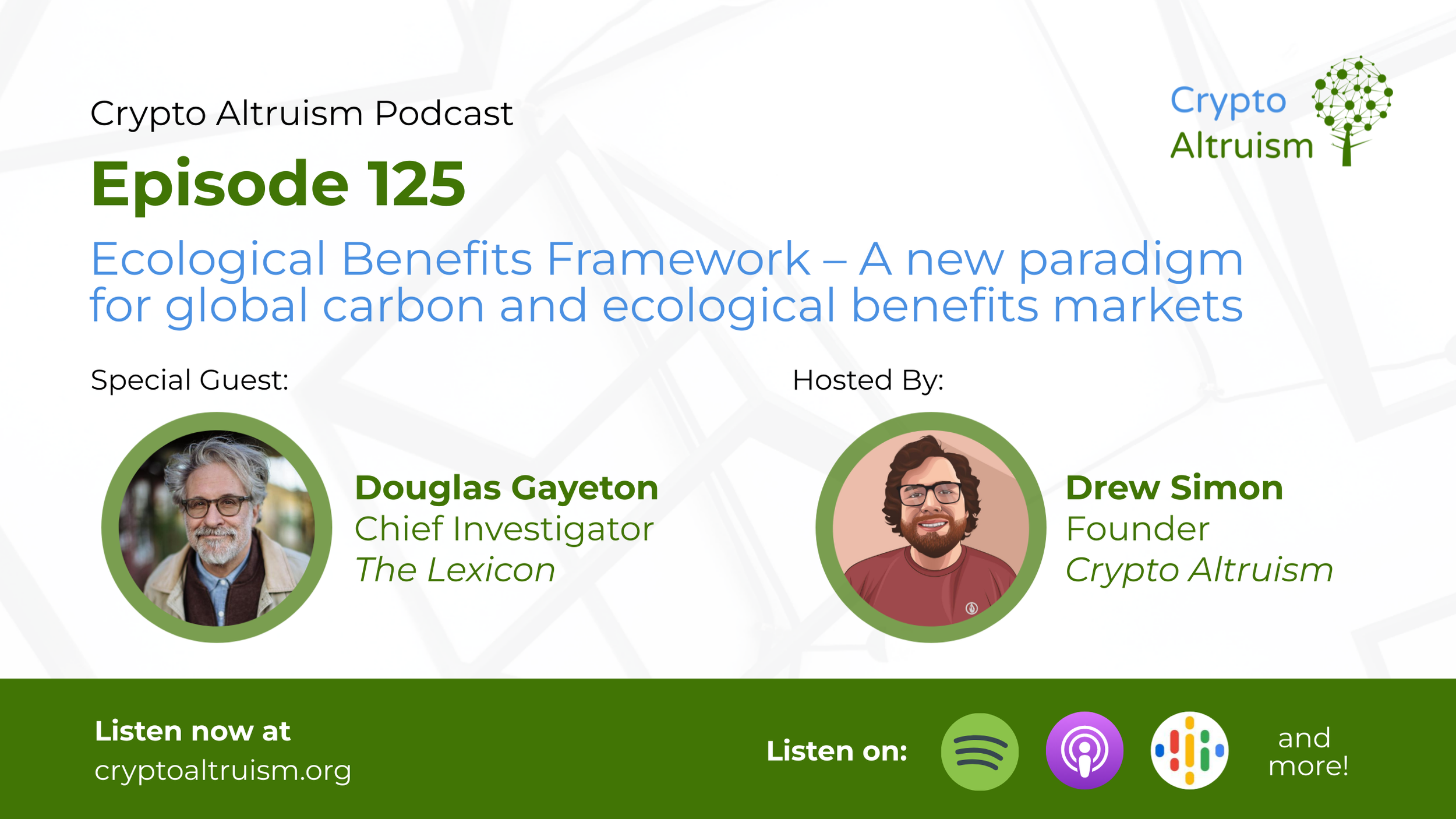Crypto Altruism Podcast Episode 125 - Ecological Benefits Framework – A new paradigm for global carbon and ecological benefits markets
In episode 125, we’re excited to welcome Douglas Gayeton, Chief Investigator at The Lexicon, a nonprofit that helps people pay closer attention to what they buy, how they live, and where their responsibility begins for creating a healthier and safer planet for all. We discuss their game changing Ecological Benefits Framework, the growing regenerative finance movement, and much more.
Three Key Takeaways
Blockchain can help us improve our understanding of food supply chains from ground to store by facilitating better collection and monitoring of supply chain data and enabling coordination amongst the various stakeholders in the supply chain.
Voluntary carbon markets are broken, and a new, multi-sector framework needs to be created to address some of the world’s biggest challenges. The Ecological Benefits Framework presents a holistic approach that incorporates six key areas of air, water, soil, biodiversity, equity, and carbon.
When measuring ecological benefits, it’s important to incorporate both quantitative and qualitative data, including Indigenous knowledge that has been around for centuries. Blockchain can help encode trust into this data.
Follow Douglas and The Lexicon
Ecological Benefits Framework - Website
PBS Documentary - True Cost Accounting: The Real Cost of Cheap Food
Episode Time Stamps
02:20 - What was your “Ah hah” moment that got you excited about blockchain/web3 in the beginning?
05:45 - Food is something that many take for granted, and we rarely see the full story of where our food comes from, and the true cost of that food getting from point of harvest to their table. What are some of the challenges that exist in food chains that the average person needs to be aware of?
09:50 - Can you please give listeners a high-level overview of the mission of The Lexicon?
13:05 - You recently launched Ecological Benefits Framework, which serves as “a framework for diverse investors to create positive impacts in six key areas: air, water, soil, biodiversity, equity, and carbon.” Tell me more about this.
17:10 - How is blockchain implemented in the Ecological Benefits Framework?
19:55 - Another important piece of the puzzle is The Bundled Ecological Benefits Token. Can you tell me more about this?
26:00 - I understand there are many partners involved in the EBF Activator. Can you tell me more about the partners involved in the collaboration?
32:35 - The Regenerative Finance movement has gained a lot of momentum over the last couple of years – what do you feel are some of the most exciting ReFi use cases?
38:20 - How can blockchain change how people understand where there food comes from, and support socially conscious consumption of food?
41:35 - I’m fascinated by the concept behind Lex Icons, which aim to serve as a universal language to describe our food systems – I’d love to learn more about the Lex Icons.
45:40 - What’s the best way for listeners to follow you and learn more about The Lexicon and the Ecological Benefits Framework?
47:40 - To wrap things up, if you could name one thing that excites you most about the social impact potential of web3, what would it be and why?
Send a tip in ETH: cryptoaltruism.eth
Like what you’re reading? Consider contributing to Crypto Altruism so we can continue putting out great content that shines a light on the good being done in the crypto and blockchain community.
DISCLAIMER
While we may discuss specific web3 projects or cryptocurrencies on this podcast, please do not take any of this as investment advice, and please make sure to do your own research on potential investment opportunities, or any opportunity. We host a variety of guests on this podcast with the sole purpose of highlighting the social impact use cases of this technology. That being said, Crypto Altruism does not endorse any of these projects, and we recognize that, since this is an emerging sector, some may be operating in regulatory grey areas, and as such, we cannot confirm their legality in the jurisdictions in which they operate, especially as it pertains to decentralized finance protocols. So, before getting involved with any project, it’s important that you do your own research and confirm the legality of the project. More available HERE.
We may make use of affiliate marketing to provide readers with referrals to high quality and relevant products and services.




